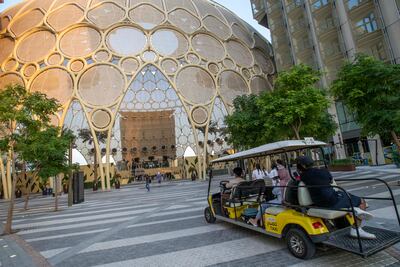The world is “not on track” to slow global warming to 1.5°C, leaders have been told in a landmark progress report that will shape the Cop28 climate summit in the UAE.
Governments will decide in a first “global stocktake” in Dubai what to make of a verdict that “much more action”, projected to cost trillions of dollars, is needed to limit damage to the planet.
The UN on Friday unveiled a 47-page technical report underpinning the stocktake, based on more than a year of talks with countries who will attend Cop28.
Overseen by scientists Farhan Akhtar of the US and Harald Winkler of South Africa, the report paves the way for the stocktake’s keenly awaited “political phase” in Dubai.
Dr Sultan Al Jaber, the summit’s President-designate and UAE Minister of Industry and Advanced Technology, called on leaders to “come to Cop28 with real and actionable commitments to address climate change”.
“This global stocktake report provides clear direction on how we can meet the expectations of the Paris Agreement by taking decisive action in this critical decade,” he said.
He added that countries should show “ambition and urgency” to cut greenhouse gas emissions 43 per cent by 2030. The energy transition is one of his four pillars for the summit along with finance, livelihood and inclusivity.
“I believe we can deliver all of this while creating sustainable economic growth for our people, but we must urgently disrupt business as usual and unite like never before to move from ambition to action and from rhetoric to real results,” he said.
The report says the Paris Agreement, which established the 1.5°C goal and set the date of the first stocktake for 2023, has “driven near-universal climate action” since its adoption eight years ago.
However, progress is “still inadequate based on the best available science” and “the window to keep limiting warming to 1.5°C within reach is closing rapidly”, it says.
“The global community is not on track to meet the long-term goals set out in the Paris Agreement, despite the collective progress made,” governments are told in the report.
“As this report shows, much more action is needed now, on all fronts and by all actors, if the long-term goals of the Paris Agreement are to be met.”
The UAE’s Cop28 presidency has told diplomats that the stocktake “will frame all of our work” at the summit, which opens at Dubai’s Expo City on November 30.

Clean energy 'indispensable'
In other assessments, the report says:
· Scaling up renewable energy and phasing out all unabated fossil fuels are “indispensable elements” of cutting emissions to net zero
· Halting deforestation and improving agricultural practices are also “critical to reducing emissions”
· The timing of reaching net zero “will vary by country” but the whole world should pursue green policies that can also help achieve development goals
· More efforts are “urgently needed” to prepare for climate effects that are already “eroding past human development gains”
· It is “essential to unlock and redeploy trillions of dollars” to invest in climate action, with developing countries needing a rapid injection of funds
· Funding to meet the cost of climate disasters (“loss and damage” in UN jargon) should be “rapidly scaled up” and come from “expanded and innovative sources”.
The UN's climate chief Simon Stiell urged governments to “carefully study the findings of the report”.
“The global stocktake is a critical moment for greater ambition and accelerating action,” he said.

The 1.5°C goal refers to the rise in average global temperatures compared with pre-industrial times. Scientists say that outcomes such as extreme weather and natural disasters will be considerably greater if the world misses its target.
Each country is responsible for setting its own policies to contribute to the Paris Agreement’s goals, so the stocktake was set up as a way to review overall progress.
While there is general consensus that more action is needed, countries often spar over issues such as targets on abandoning fossil fuels and asking rich countries to contribute more financial firepower.
Report sets agenda for Cop28
Gareth Redmond-King, an analyst at the Energy and Climate Intelligence Unit in Britain, said the report “represents the most comprehensive and detailed evidence yet” that the world is off track in terms of the 1.5°C target.
“We need only look around us in this hottest northern hemisphere summer, plagued with fires and floods, to see the human and financial cost of climate change,” he said.
“All the evidence shows acting now is cheaper than not, and this report very clearly sets the agenda for the Cop28 presidency, and the task for leaders who will meet in Dubai in December to agree how to close this dangerous gap.”
Countries will use Cop28 to deliver a “political outcome” of the stocktake. There is then a 2025 deadline for governments to hand in updated climate plans, taking the stocktake into account.
Future global stocktakes are due at five-yearly intervals.


